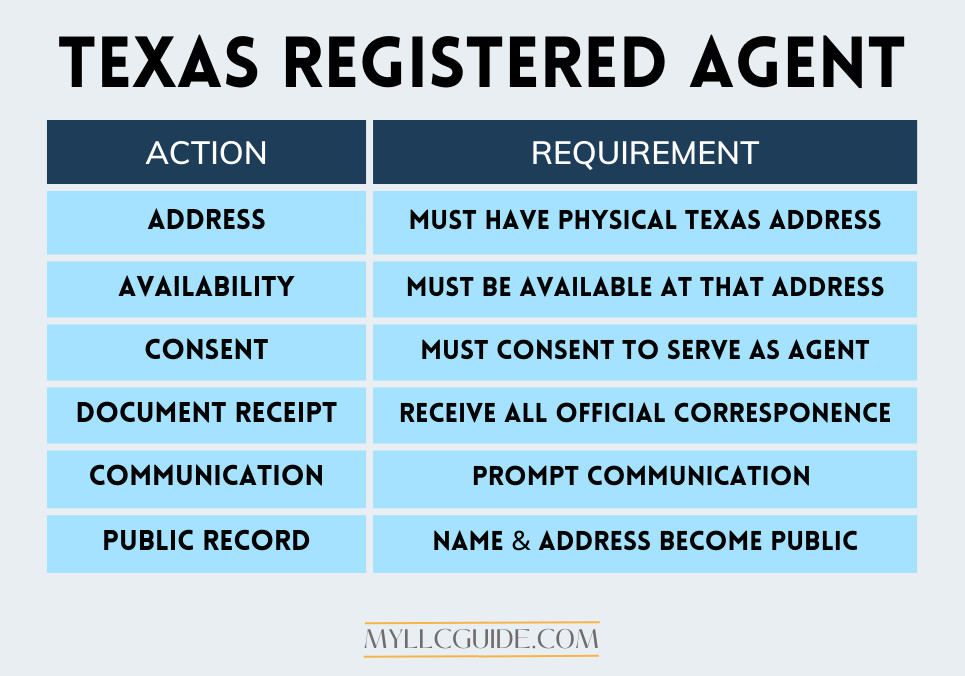
If you form a company in Texas you must also have a registered agent. A registered agent is the company’s point of contact for all official documentation. And, it is where the authorities send all official communication for a Texas-registered company. Below we cover everything you need to know about a registered agent Texas.
What Is a Texas Registered Agent?
A Texas registered agent is an individual or business that receives official documentation on behalf of a company formed in the state. In the words of the Texas Secretary of State, they are “an agent of the entity on whom may be served any process, notice, or demand required or permitted by law to be served on the entity”.
They are the first point of contact for a Texas-based LLC. If a federal or Texas state authority need to contact a company – they send all official documentation to that company’s registered agent.
What Does a Texas Registered Agent Do?
A Texas registered agent receives all official documentation on behalf of a company registered in the state. This includes all legal and tax-related documents that require a response from the company. When the agent receives documents they must pass them onto the company members promptly.

What Are the Requirements?
There are some specific requirements an agent needs to meet and several duties they need to perform as a Texas registered agent. These relate to the location and availability of the agent. And, the duties they must perform when receiving official documents and communication. Let’s take a closer look.

• Physical Address
The agent must have a physical address in the state of Texas. This address is referred to as the registered office. This address will be used for all official correspondence for the company. It cannot be a PO (post office) box.
• Availability
They are an ‘always-available’ contact for the authorities. A registered agent in Texas must be available at a specified address during regular business hours (9 am – 5 pm), Monday to Friday.
• Consent to Serve
The agent must consent to serve as a registered agent for the company. Consent is usually captured in the company’s formation documents when filing with the Texas Secretary of State. Alternatively, an agent can issue consent by completing form 401-A (Word, PDF) and 1 Tex Admin Code § 79.29 either in written or electronic form and submitting it to the Office of the Secretary of State.
• Receipt of Official Documentation
The registered agent must receive all documentation sent to the company at the registered office address. These documents include legal notices, court summons, and tax documents.
• Timely Communication
Once documents are received, the agent must communicate them with the appropriate individuals in the company. This must be done in a timely manner which allows the company to respond appropriately and within legal deadlines.
• Public Record
The identity and address of a company’s registered agent will be filed and become public record. This should be considered before filing the name and details of an individual that is acting as an agent for a company. For this reason, many companies tend to hire the services of a professional registered agent service.
How to Appoint a Texas Registered Agent
How do you appoint a registered agent in Texas? There are a series of steps you must follow when appointing an agent for your company. If you are forming a new company, you will appoint an agent as part of filing your company formation documents. Follow the steps below.

1: Choose a Registered Agent
First up, you need to choose a registered agent for your company. This can be an individual, company employee, or professional service that meets all the necessary state requirements.
2: Gather the Agent’s Information
Once you have chosen your registered agent you must gather the information you need to complete the documentation. This includes their name, physical address, and contact details. Note, the address must be a Texas address and you cannot use a P.O. Box.
3: Complete Documentation
Complete your documentation and capture your registered agent details. In most cases, this is done when forming a company. Therefore, record the name, address, and contact details of your agent in your Certificate of Formation for an LLC or Articles of Incorporation for a corporation.
4: Agent Consent
Next up, you need to get consent from the agent. This involves the agent completing a section within the company’s formation documents that explicitly state that the individual or professional service consents to acting as registered agent on behalf of the company.
5: Submit to Texas Secretary of State
Once all documentation is complete it must be filed with the Texas Secretary of State’s office. You will also have to pay a formation fee if you are forming a new company. The documents can be filed online or by mail.
6: Verification & Approval
The Texas Secretary of State’s office will then review your paperwork. If everything is in order the filing will be approved. Your company will be formed and your nominated registered agent will officially become your company’s agent.
READ NEXT
Who Can Serve as a Texas Registered Agent?
In Texas, an individual state resident or organization that is registered or authorized to do business in Texas can be a registered agent. Also, an officer, owner, or company employee can serve as registered agent as long as they have a physical address within Texas.

The nominated agent must be contactable at the specified address during regular business hours Monday to Friday – all year round. Note, a company cannot serve as its own registered agent. Similarly, the secretary of state or other government agency cannot serve as a registered agent.
RELATED
- How to Form an LLC in Texas Quickly
- Here’s How to Register an LLC in Texas
- How Much Does a Texas LLC Cost?
- Texas LLC Operating Agreement
Can You Be a Registered Agent for Your Company?
Yes, in Texas you can be a registered agent for your own company as long as you satisfy all the requirements outlined above. However, you should note that once a registered agent is appointed for a company their personal details are placed on public record. This often causes privacy concerns that individuals would rather avoid. To protect privacy, many companies hire a professional registered agent service.
READ NEXT
- Registered Agent Illinois – All You Need to Know
- Florida Registered Agent – Simple Guide
- Indiana Registered Agent – Quick Overview
- Kentucky Registered Agent – Overview
About the Author
Jason Roth: Editor in Chief
Jason is editor in chief at My LLC Guide. He holds a wealth of business management experience and has been advising companies on business formation issues for many years. Jason specializes in resource planning management, staff utilization, and productivity consulting.
He has worked predominantly in the west coast area where he graduated from the Marshall Business School at the University of South California. When he’s not working in his business advisory role, Jason likes to climb on his Indian Scout motorbike and enjoy the open road.